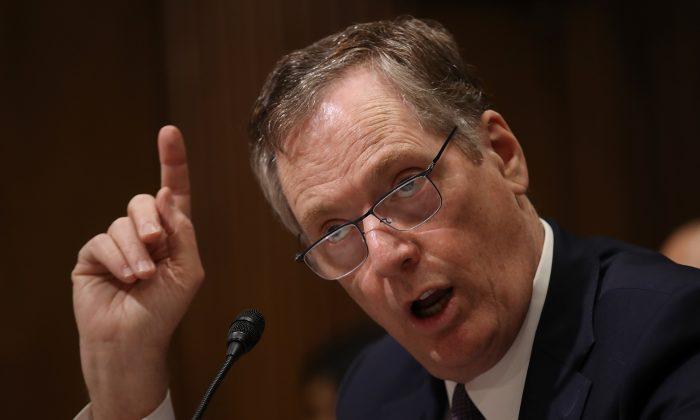The Office of the U.S. Trade Representative (USTR) is considering launching a new investigation into labor practices in China as a way of sanctioning the Chinese regime on trade, according to a Nov. 8 report by Inside U.S. Trade, an online news service covering the trade industry.
The USTR previously used the Section 301 statute to investigate China’s intellectual property theft practices, which prompted the Trump administration to impose punitive tariffs on a total of $250 billion worth of Chinese imports earlier this year.
Now the USTR, led by Robert Lighthizer, is considering a Section 301 investigation into China’s labor practices.
“You are going to see Bob Lighthizer, who is a very adept politician, looking for progressive things he can do to get support on trade now that the House has flipped,” a private-sector source told Inside U.S. Trade, referring to the results of the midterm elections, which saw Democrats win a majority of the House of Representatives seats. The USTR office did not respond to a request for comment by press deadline.
In 2004 and 2006, the American Federation of Labor and Congress of Industrial Organizations (AFL-CIO), the country’s largest consortium of labor unions, had filed Section 301 petitions asking the USTR office to investigate whether China gained unfair trade advantages by violating workers’ rights. But the USTR office denied the petitions.
Focusing on labor practices would be similar to the United States’ recent trade deal with Canada and Mexico, called simply the U.S.–Mexico–Canada Agreement, or USMCA.
The deal requires that 40 percent of a manufactured vehicle eligible for duty-free importing must be made by workers earning a minimum of $16 an hour.
The agreement was seen as a new tactic by the U.S. administration to target China’s unfair trade practices, as the USMCA also specifies that if one of the current NAFTA partners enters a free-trade deal with a “non-market” country such as China, the other two can quit in six months and form their own bilateral trade pact with each other.
In an interview with Reuters, Derek Scissors, a China scholar at the American Enterprise Institute in Washington, said the provision gave the Trump administration an effective veto over any China trade deal by Canada or Mexico.
Furthermore, if repeated in other U.S. negotiations with the European Union and Japan, it could isolate Beijing in the global trading system.





